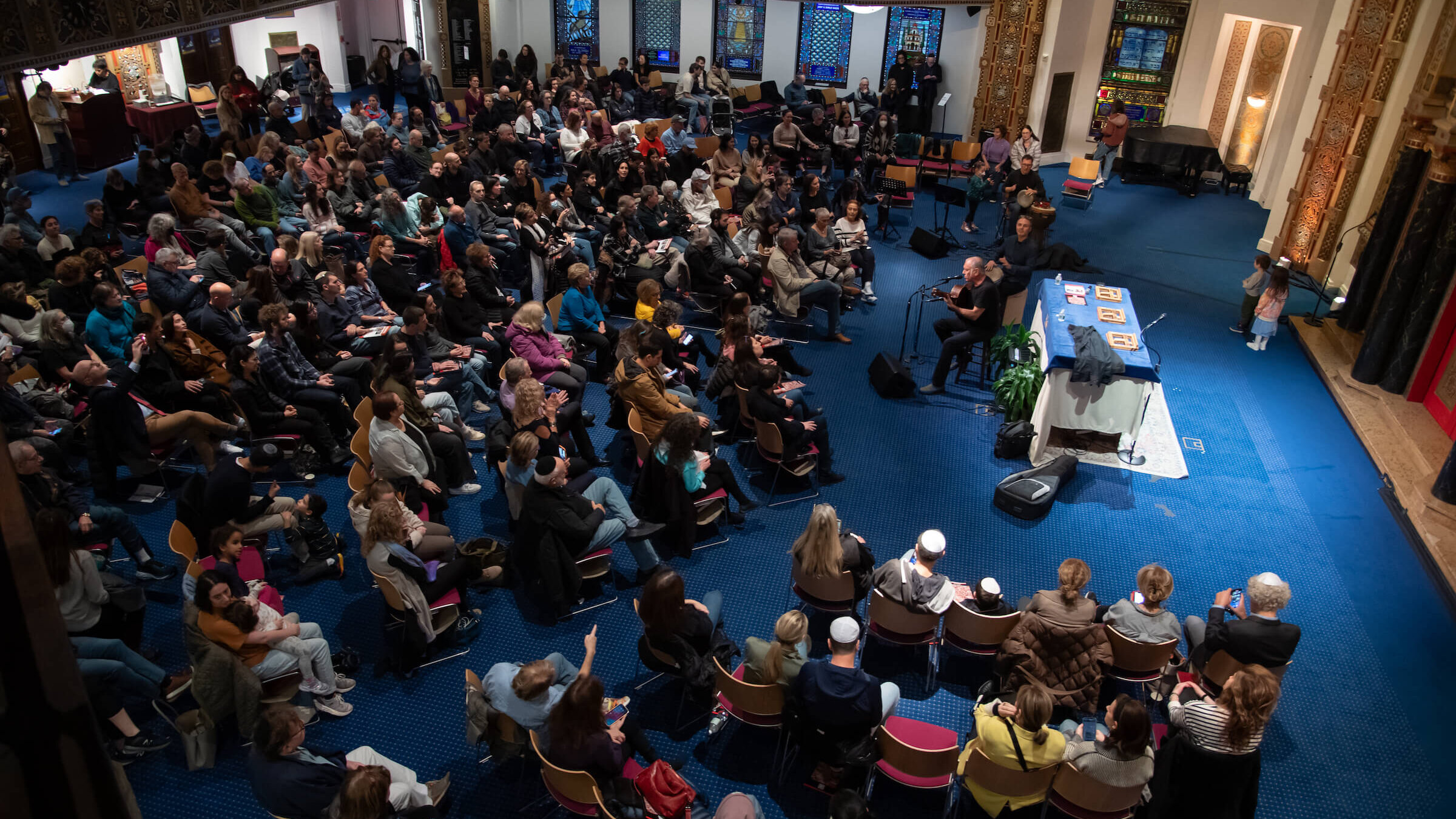‘It’s hard to be a Jew’ — old Yiddish proverb never felt more resonant in America
Rabbis, parents of young children and teenagers all reeling from antisemitism or its silent sanction

A gathering last week at B’nai Jeshurun on Manhattan’s Upper West Side. Photo by Noam Galai/Getty Images
The American Jewish community is under siege. In too many circles, it is not safe to be a Jew.
Parents of my synagogue’s youngest children told me last week they were sitting together in a local park with their little ones playing nearby when a man suddenly yelled: “Are any of these kids Jewish?” Terror flooded their veins.
Parents of our elementary schoolers have concerns that are more complex. Many of them perceive their schools’ leadership as failing to address Israel’s war against Hamas with moral clarity, suggesting instead equivalency between Hamas’ barbarism and Israel’s efforts to protect its people. Their children are lonely among non-Jewish classmates too young to comprehend the anxiety their Jewish friends have internalized at home. Most teachers are ill-equipped to address the discomfort, let alone the conflict in the Middle East.
Understandably so. No one was ready for this. I have reassured the parents that these are well-intentioned educators, but lack of preparedness left them unable to find the words to describe or the tools to address this tragedy. Three weeks in, some still haven’t.
These parents are baffled by what they perceive as a double standard about antisemitism. They fully supported the thoughtful Diversity, Equity and Inclusion initiatives recently implemented in workplaces and schools to draw greater awareness to the myriad microaggressions targeting other minority communities. Now they wonder why microaggressions directed at their own children do not qualify for redress.
I have met with high school students experiencing what we thought was reserved for their college peers: Social exclusion because they are Jewish, and the politicization of classroom discussions where Israel is portrayed as the root cause of Palestinian suffering.
“I am so glad to be in temple right now,” one of them told me this week. It’s not normally a common teenage refrain. In synagogue, she explained, she was surrounded by other Jews and felt a safety she did not feel anywhere else.
I have also heard from college students who feel isolated and alone. On the quad, some describe an atmosphere of vicious bullying, others of physical intimidation. Like me, they have read about confrontations at Tulane and UPenn and, here in New York, at Cooper Union, where Jewish students sought cover inside a library while anti-Israel protesters banged on the doors. Some of the college students from my congregation are truly afraid, and just want to come home.
Conversations with rabbinic colleagues are also distressing. They are bewildered that interfaith partners they have relationships with failed to reach out after Hamas’ brutal assault, and weeks later still won’t acknowledge the suffering of Israeli Jews without the caveat that it be considered in a broader historical context. These rabbis now question whether the energy and years devoted to interfaith bridge-building were a waste.
Shver tsu zayn a Yid — It’s hard to be a Jew, said the old Yiddish proverb. That perhaps has never been more true in the United States.
Throughout our history here, we have faced our share of exclusion — from businesses, schools, neighborhoods and social clubs. And the last decade witnessed a terrifying increase in antisemitic rhetoric and violence. For far longer than that, Israel has been demonized on college campuses and in other academic settings.
But never in my 25 years in the rabbinate have I witnessed the level of anguish American Jews are experiencing right now.
I write these words as I prepare to board a plane to Israel. I’m going to express solidarity with their suffering, but being there will comfort me too.
Not a day since its founding 75 years ago has Israel known true peace on its borders. Israeli Jews live under the constant threat of terror. Yet they carry on with a resolve born of the necessity former Prime Minister Golda Meir first articulated and our own President Joe Biden recently reiterated: They have nowhere else to go.
And so will we carry on in the U.S. I do not believe the alienation American Jews have experienced to be irreparable. The wounds inflicted on us by word and by silence will heal. I refuse to give up on my relationships with leaders of other faith communities, some of whom have indeed stood bravely beside me during this most painful time. And I still believe in the principles on which America was founded, which George Washington repeated to the Hebrew Congregation in Newport with the commitment: “To bigotry no sanction, to persecution no assistance.”
But just as Israel’s government will be called to account for the lapses that allowed Hamas’ murderous rampage on Oct. 7, so will U.S. academic institutions, business leaders, and even clergy have to acknowledge their failures to distinguish between aggressor and victim and their silent sanction of antisemitic attacks against us.






















